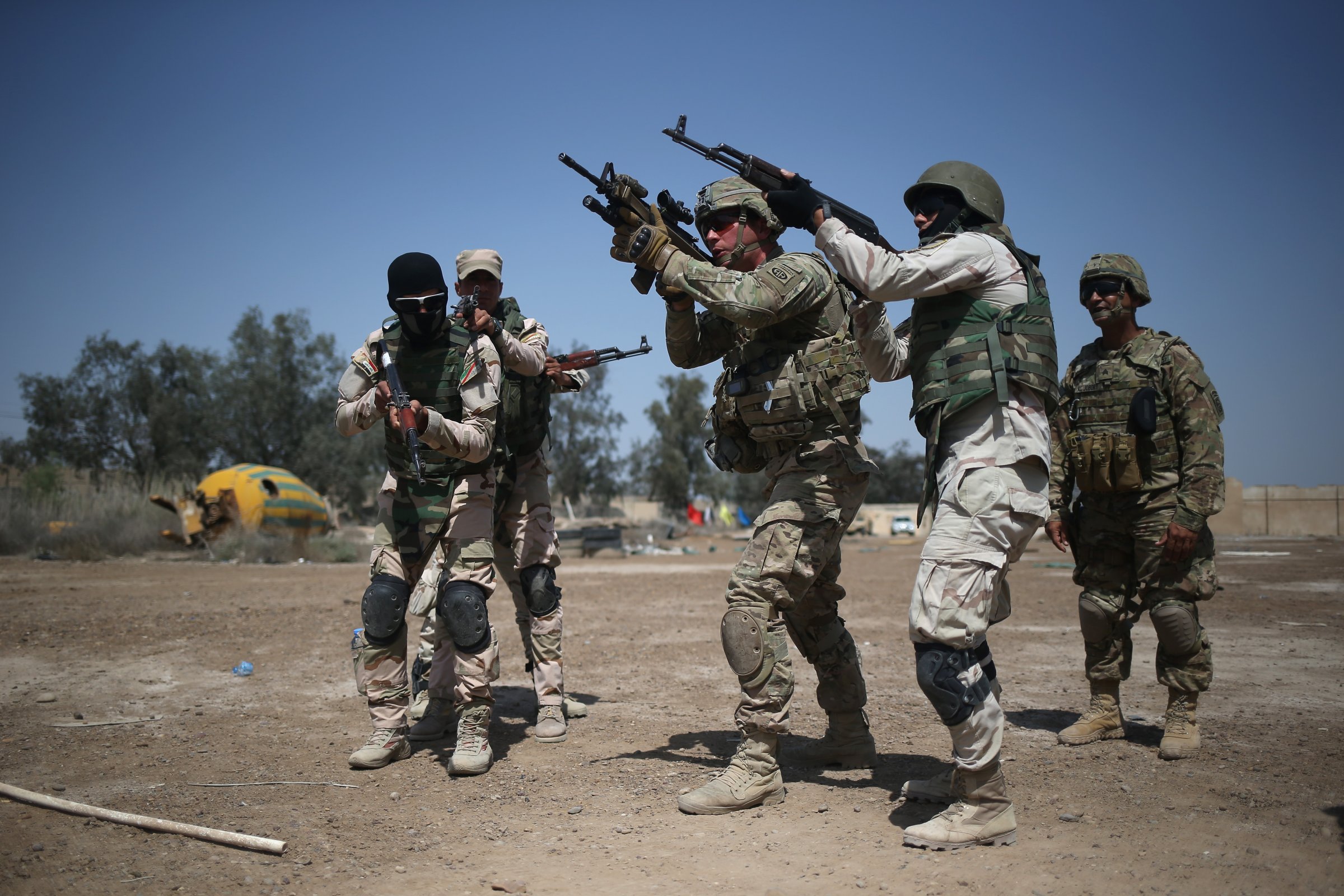
The U.S. military likes to say that when it comes to war, the enemy gets a vote. President Obama made that clear Wednesday as he continued to retool his strategy to “degrade and destroy” the Islamic State of Iraq and Greater Syria. The biggest tweak to U.S. policy was his decision to boost the 3,180 U.S. trainers and advisers in Iraq by as many as 450 additional troops.
The White House has made it clear U.S. troops will be limited to advising and training Iraqi forces and will not be sent into combat against ISIS. “To improve the capabilities and effectiveness of partners on the ground, the President authorized the deployment of up to 450 additional U.S. military personnel to train, advise, and assist Iraqi Security Forces at Taqaddum military base in eastern Anbar province,” White House spokesman Josh Earnest said in a statement. But some on Capitol Hill were not impressed by Obama’s reinforcements. Rep. Mike Turner, R-Ohio, a senior member of the armed services committee, called them a “knee-jerk reaction” to recent poor showings by the Iraqi army, rather than a “long-term strategy.”
In many ways, this assignment is déjà vu for the U.S. military. They were ordered into Iraq in the wake of the U.S.-mandated dissolution of the Iraqi army following the 2003 invasion, and told to build a new one from scratch. After all U.S. forces left in 2011, the Iraqi army basically fell apart because of the cronyism and corruption that took place under Nouri al-Malaki, Iraq’s prime minister from 2006 to 2014. Over the past several months they’ve begun anew, training more than 9,000 Iraqi troops, with 3,000 more in the pipeline.
Those sectarian splits caused by Malaki’s government sapped the Iraqi forces “will to fight” to save Ramadi from being overrun by ISIS last month, Defense Secretary Ash Carter said. While training can give troops the skills needed to prevail on the battlefield, training can’t teach will. Nonetheless, U.S. troops who trained Iraqi forces the first time around say Iraqi forces, given decent leadership, are good fighters. They’ve shared their experiences with Army interviewers. The resulting oral histories offer guidance to those U.S. trainers in, or soon headed for, Iraq.
In the initial rebuilding of the Iraqi army, many units suffered from a Saddam Hussein hangover, where the traditional top-down and centralized command structure stifled innovation and initiative. While the passage of time has eased that problem, Iraqi forces remain hampered by their inability to support their forward forces with the intelligence and logistical support that makes for an effective fighting force. That’s less critical for their ISIS foes, whose terror tactics sow fear across wide swaths of Iraq with only hit-and-run attacks.
U.S. officers who trained Iraqi troops the first time around learned they had to adjust their expectations. “As Americans, we tend to look at things through American goggles, but when you’re over there you have to take off those American goggles and put on the Iraqi goggles,” Army Major Dave Karsen explained following his 2006 training tour. “Once you do that it was like, `Oh, you guys are doing fine by Iraqi standards.’ Put those American goggles back on and it’s like, `You guys are 50 years in the weeds. You guys are operating at a 1918 U.S. capability compared to now.’ It’s just a totally different mindset.”
The key lesson for U.S. trainers was that Iraqi troops are trainable. “When an IED event happened, their first reaction early on was what is referred to as the ‘Iraq death blossom,’ where everybody starts shooting in every direction,” Major Matt Schreiber said of his training stint. “That poses a lot of problems for a number of reasons.” But the Iraqis shaped up with training: “If an IED blew up or detonated, despite the damage and the casualties it caused, we were confident that our Iraq army soldiers would respond they way that they were trained.”
“My personal experience with the Iraqis under fire is that they are very brave and they’re not afraid to fight,” Major William Taylor said. “You tend to find that they’re willing to take risks and do things that American soldiers would never do.” He recalled Iraqi soldiers who found an improvised explosive device and watching one of them “poking the IED with a stick.” Such bravery—or foolhardiness—could be wasted without good leadership. But, he added, “when they had good leaders, they would fight very hard.”
Iraqi leadership often left something to be desired. One brigade commander “would conduct an operation if he could get the local media or the national media to come down and videotape him,” Major Mark Fisher said. But he canceled two operations “at the last minute … because the media told him that they could not make it out today, which is a poor reason for canceling an operation.”
More Must-Reads From TIME
- The 100 Most Influential People of 2024
- The Revolution of Yulia Navalnaya
- 6 Compliments That Land Every Time
- What's the Deal With the Bitcoin Halving?
- If You're Dating Right Now , You're Brave: Column
- The AI That Could Heal a Divided Internet
- Fallout Is a Brilliant Model for the Future of Video Game Adaptations
- Want Weekly Recs on What to Watch, Read, and More? Sign Up for Worth Your Time
Contact us at letters@time.com